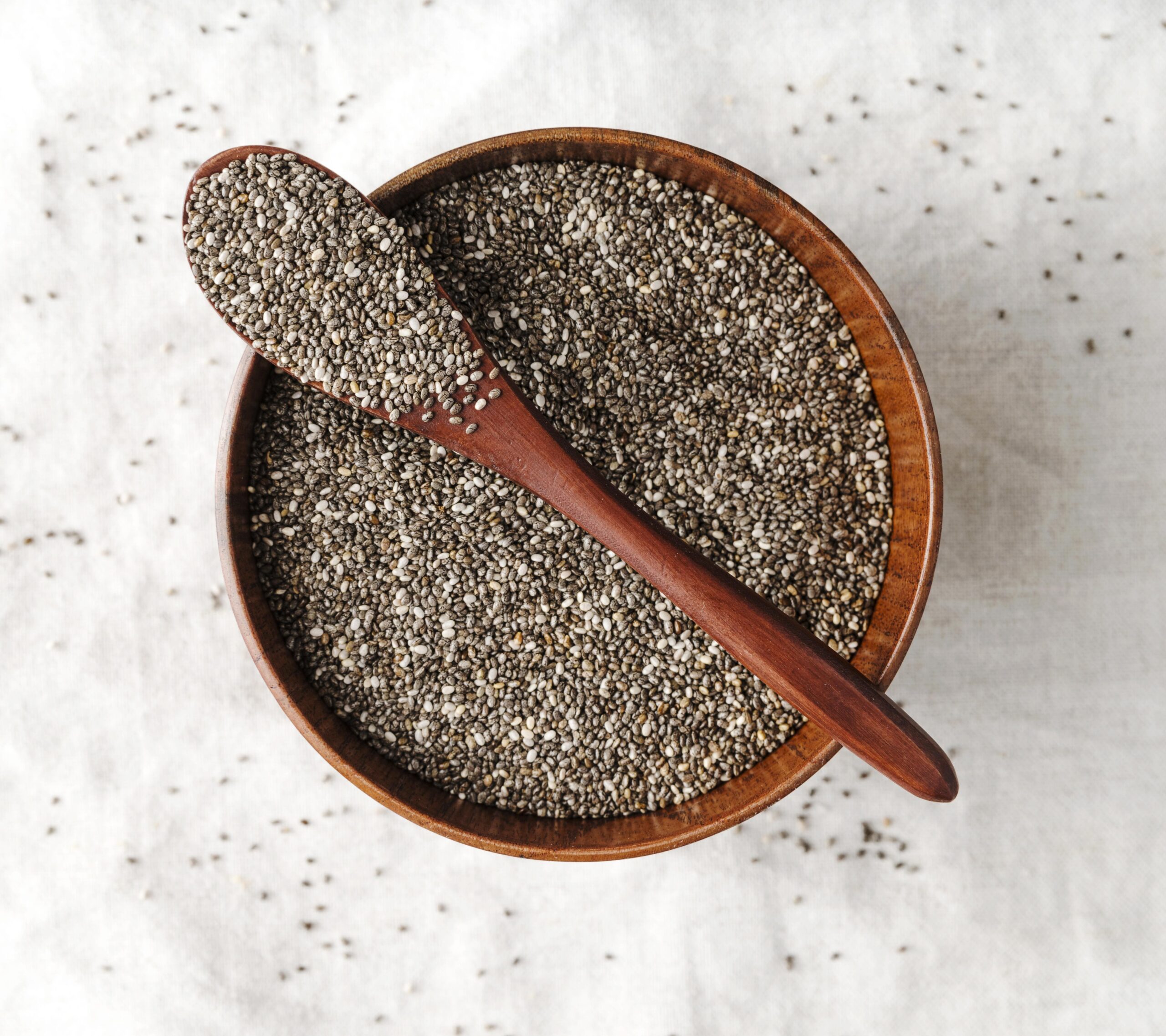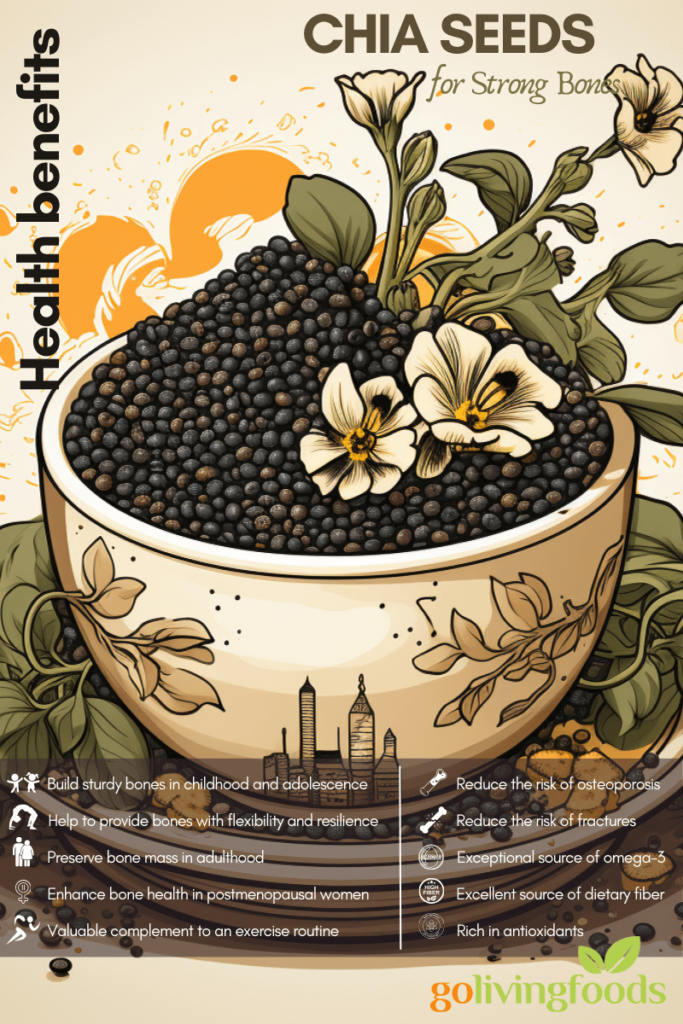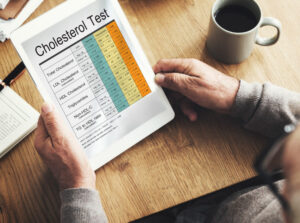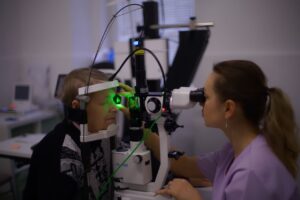Chia Seeds: Nature’s Tiny Powerhouses for Strong Bones

Chia seeds have been gaining immense popularity as a superfood in recent years. Packed with a remarkable array of nutrients, these small seeds have garnered attention for their potential to support various aspects of health and well-being. One area where chia seeds shine is in promoting strong bones. In this article, we will delve into the wonders of chia seeds and explore their role in building and maintaining healthy bones.
The Nutritional Power of Chia Seeds
Before we dive into their bone-strengthening benefits, it’s crucial to understand the nutritional prowess of chia seeds. These unassuming seeds are brimming with essential nutrients that contribute to overall health. Just a single ounce of chia seeds contains a wealth of nutrients, including fiber, protein, healthy fats, calcium, magnesium and phosphorus. Each of these components plays a vital role in supporting various bodily functions, with special attention to bone health.
Below is the nutritional composition of chia seeds (per 100 g) :
| Macronutrients | (g) | Minerals | (mg) | Vitamins | (mg) | Fatty acid | (%) | Phenolic compounds | (µg) |
| Carbohydrates | 42 | Magnesium | 335 | Vitamin A eq. µg | 54 | Linolenic acid | 63.79 | Cafeic acid | 27 |
| Dietary fibers | 34.4 | Phosphorus | 860 | Vitamin E | 0.5 | Linoleic acid | 18.89 | Quercetin | 0.17 |
| Protein | 17 | Calcium | 631 | Vitamin C | 1.6 | Oleic acid | 7.3 | Kaempferol | 0.013 |
| Fat | 31 | Potassium | 407 | Thiamine (B1) | 0.62 | Palmitoleic acid | 0.03 | Daidzin | 6.6 |
| Natrium | 16 | Riboflavin (B2) | 0.17 | Palmitic acid | 7.04 | Glycitin | 1.4 | ||
| Other (g) | 13 | niacin (B3) | 8.83 | Genistin | 3.4 |
Chia Seeds and Bone Density
Bone density refers to the amount of mineral content, primarily calcium and phosphorus, present in bones. Higher bone density translates to stronger bones and a reduced risk of fractures. As individuals age, bone density tends to decrease, making bones more susceptible to fractures and osteoporosis, a condition characterized by brittle and fragile bones.
1. Calcium: Building Block for Bone Density
Chia seeds are an excellent source of calcium, a mineral widely recognized for its role in maintaining bone density. Calcium is not only crucial for building strong bones during childhood and adolescence but also for preserving bone mass in adulthood and preventing bone loss later in life.
Research has shown that incorporating calcium-rich foods like chia seeds into the diet can have a positive impact on bone density and reduce the risk of osteoporosis. one study found that postmenopausal women who consumed chia seeds daily experienced significant increases in bone mineral content and bone density over a period of six months.
2. Phosphorus: Strengthening Bone Structure
Phosphorus is another essential mineral found in abundance in chia seeds. Together with calcium, phosphorus forms the mineral matrix that provides strength and rigidity to bones. Phosphorus works in tandem with calcium to ensure proper bone formation, mineralization, and repair.
While calcium tends to receive more attention in discussions about bone health, phosphorus plays an equally vital role in maintaining bone density and strength. Including phosphorus-rich foods like chia seeds can contribute to the overall structural integrity of bones and support their function in the body.
3. Magnesium: Enhancing Bone Density
Chia seeds are a noteworthy source of magnesium, a mineral that works synergistically with calcium and vitamin D to optimize bone health. Magnesium is involved in various cellular processes related to bone formation and supports the conversion of vitamin D into its active form, which is essential for calcium absorption.
Studies have indicated that magnesium intake is positively associated with bone mineral density. Chia seeds, can help enhance bone density and reduce the risk of fractures, particularly in postmenopausal women who are at a higher risk of osteoporosis.
Chia Seeds and Bone Strength
Bone strength refers to the ability of bones to withstand pressure and support body weight without fracturing or breaking. Alongside bone density, bone strength is critical for overall bone health and resilience.
1. Omega-3 Fatty Acids: Promoting Bone Strength
Chia seeds are an exceptional source of alpha-linolenic acid (ALA), a type of omega-3 fatty acid. Omega-3 fatty acids are renowned for their anti-inflammatory properties and their role in supporting heart health, but they also contribute to bone strength.
Research has suggested that omega-3 fatty acids can enhance bone strength by improving bone quality and reducing bone resorption, the process of breaking down bone tissue. In a study involving postmenopausal women, those who consumed omega-3 fatty acids from plant-based sources, such as chia seeds, experienced a decrease in bone resorption markers, indicating improved bone health.
2. Protein: The Building Blocks of Bone
Chia seeds contain a notable amount of plant-based protein, which is essential for bone health. Protein serves as the building blocks for bones, and adequate protein intake is necessary for bone formation and repair.
Protein intake has been associated with improved bone density and reduced risk of fractures. Additionally, protein plays a role in maintaining muscle mass and strength, which can indirectly support bone health by reducing the risk of falls and fractures.
3. Silicon: A Lesser-Known Bone Booster
Chia seeds also contain silicon, a trace mineral that is less recognized but nonetheless beneficial for bone health. Silicon contributes to the synthesis of collagen, a protein that forms the framework of bones and provides them with flexibility and resilience.
Studies have indicated that silicon supplementation can enhance bone mineral density, particularly in individuals with lower dietary silicon intake. By incorporating chia seeds into the diet, which are naturally rich in silicon, individuals can potentially support bone strength and structure.
Nutrient Synergy for Bone Health
Chia seeds also contain a range of micronutrients that play vital roles in bone health. These include :
Antioxidants and Fiber: Bone Health Support
Chia seeds are rich in antioxidants, such as Flavonoids and phenolic compounds, which help neutralize harmful free radicals in the body. Oxidative Stress can negatively impact bone health, so a diet high in antioxidants from sources like chia seeds may offer protection.
Moreover, chia seeds are an excellent source of dietary fiber. Adequate fiber intake is associated with better nutrient absorption, digestion, and gut health. A healthy gut is crucial for the absorption of bone-supporting nutrients like calcium and magnesium.
Incorporating chia seeds into the diet provides a comprehensive array of essential nutrients and antioxidants that contribute to bone health. Their calcium, phosphorus, magnesium, zinc, iron, copper, manganese, boron, potassium, and B vitamins content, combined with their antioxidant and fiber-rich nature, makes them a powerhouse for building and maintaining strong bones.

Chia Seeds for Different Age Groups
Chia seeds offer numerous benefits for individuals of all ages, making them a valuable addition to a well-balanced diet. Let’s explore how chia seeds can support bone health in different age groups:
1. Children and Adolescents: Building Strong Bones
Childhood and adolescence are critical periods for bone development and growth. During these stages, the body requires sufficient nutrients to build a strong skeletal foundation that will support health throughout life.
Chia seeds can be particularly beneficial for children and adolescents due to their rich calcium content. Adequate calcium intake during these formative years is essential to maximize peak bone mass and reduce the risk of fractures later in life.
2. Adults: Maintaining Bone Density
As individuals reach adulthood, bone growth slows down, and the focus shifts to maintaining bone density and strength. Chia seeds can play a vital role in supporting bone health during this stage of life.
The combination of calcium, phosphorus, magnesium, and other essential nutrients in chia seeds contributes to bone mineralization and helps maintain bone density. Additionally, the antioxidants in chia seeds can help counteract oxidative stress, which can have a detrimental effect on bone health.
Incorporating chia seeds into the diet can be especially beneficial for adults who are physically active or engage in weight-bearing exercises, as these activities stimulate bone formation and remodeling.
3. Postmenopausal Women and Elderly: Preventing Bone Loss
Postmenopausal women and the elderly are at an increased risk of osteoporosis and bone fractures due to declining estrogen levels and age-related bone loss. Chia seeds can be a valuable addition to the diet of these individuals to support bone health and reduce the risk of fractures.
The calcium, phosphorus, and magnesium in chia seeds contribute to maintaining bone density and preventing bone loss. The anti-inflammatory and antioxidant properties of chia seeds may also help combat chronic inflammation, which can contribute to bone resorption.
Additionally, chia seeds fiber content can aid in gut health and nutrient absorption, ensuring that essential bone-supporting nutrients are absorbed optimally.
4. Pregnant and Lactating Women: Supporting Maternal and Infant Bone Health
During pregnancy and lactation, women have increased nutrient needs to support their own health and that of their growing baby. Chia seeds can be an excellent source of essential nutrients during this time, including calcium, iron, and omega-3 fatty acids.
Adequate calcium intake is crucial during pregnancy to support fetal bone development and prevent calcium depletion from the mother’s bones. Chia seeds iron content can also help prevent iron deficiency anemia, which is common during pregnancy and can impact bone health.
The omega-3 fatty acids in chia seeds, specifically alpha-linolenic acid (ALA), are beneficial for both maternal and infant bone health. ALA is a precursor to other essential omega-3 fatty acids, such as EPA (Eicosapentaenoic acid) and DHA (Docosahexaenoic acid), which play vital roles in brain and eye development.
However, pregnant and lactating women should consult with their healthcare provider before making significant dietary changes, including the incorporation of new foods like chia seeds.
5. The Elderly: Supporting Bone Health in Later Years
As individuals age, maintaining bone health becomes increasingly important to prevent falls and fractures. Chia seeds can be a valuable addition to the diet of older adults to support bone health and overall well-being.
The nutrients in chia seeds, such as calcium, magnesium, and phosphorus, can help maintain bone density and strength, reducing the risk of osteoporosis-related fractures. Additionally, the antioxidant content of chia seeds may help protect against oxidative damage that can affect bone health.
Furthermore, chia seeds soft texture and versatility make them a convenient addition to the diets of older adults, especially those who may have difficulty chewing or swallowing certain foods.
Chia Seeds and Exercise for Bone Health
Regular physical activity, particularly weight-bearing exercises, plays a crucial role in promoting bone health. When combined with a nutrient-rich diet, exercise can enhance bone density, strength, and overall bone health. Chia seeds can be a valuable complement to an exercise routine aimed at improving bone health. Let’s explore how chia seeds and exercise work together to support strong bones:
1. Weight-Bearing Exercises and Bone Health
Weight-bearing exercises involve activities where you support your body’s weight against gravity, such as walking, jogging, hiking, dancing, and resistance training. These exercises create a mechanical load on the bones, stimulating bone-forming cells called osteoblasts. As a result, bones become stronger and denser, reducing the risk of fractures.
When engaging in weight-bearing exercises, it’s essential to provide your body with the necessary nutrients to support bone remodeling and mineralization. Chia seeds, with their calcium, phosphorus, and magnesium content, contribute to the building and maintenance of bone tissue.
2. Chia Seeds as Pre-Workout and Post-Workout Fuel
Chia seeds can serve as an excellent source of energy and nutrition both before and after workouts. As a pre-workout snack, chia seeds can provide sustained energy due to their carbohydrate and healthy fat content. The combination of omega-3 fatty acids and carbohydrates can support endurance during exercise and help maintain stable blood sugar levels.
After a workout, chia seeds can aid in recovery by providing essential nutrients. Their protein content can support muscle repair and growth, while their minerals, such as calcium and magnesium, can contribute to bone health and reduce the risk of muscle cramps.
3. Chia Seed Pudding: A Nutritious Post-Workout Snack
One popular way to incorporate chia seeds into a post-workout routine is by preparing chia seed pudding. This simple and nutritious snack can be customized with various flavors and toppings to suit individual preferences. To make chia seed pudding, mix chia seeds with your choice of milk (dairy or plant-based) and a sweetener of your choice (e.g., honey, maple syrup) in a jar or bowl. Stir well and let the mixture sit in the refrigerator for a few hours or overnight until it thickens to a pudding-like consistency.
Chia seed pudding can be enjoyed after workouts to replenish nutrients and support bone health. Adding fruits, nuts, or seeds as toppings can further enhance its nutritional value.
4. Hydration and Bone Health
Proper hydration is essential for overall health, including bone health. During exercise, especially in warm weather, it’s crucial to stay hydrated to maintain optimal performance and support bone function. Chia seeds can play a role in hydration, as they can absorb and retain water, keeping you hydrated during physical activity.
You can create a hydrating chia seed drink by adding chia seeds to water, coconut water, or a sports drink. Allow the chia seeds to sit for a few minutes to form a gel-like consistency before consuming. This refreshing beverage can provide a combination of hydration, electrolytes, and essential nutrients for your exercise routine.
The Benefits of Chia Seeds Beyond Bones
Aside from their exceptional bone-nourishing properties, chia seeds offer a range of additional health benefits. Due to their high fiber content, chia seeds can support digestive health, aid in weight management, and help regulate blood sugar levels. Moreover, their omega-3 fatty acids contribute to cardiovascular health, reducing the risk of heart disease. By incorporating chia seeds into your diet, you can unlock a multitude of benefits for your overall well-being.
Incorporating Chia Seeds into Your Diet
One of the best aspects of chia seeds is their versatility in the kitchen. These tiny seeds can be easily incorporated into a variety of dishes, both sweet and savory. Add them to smoothies, oatmeal, yogurt, salads, or even make a chia seed pudding for a delightful and nutritious treat. The mild, nutty flavor of chia seeds complements various foods, making them an effortless addition to your meals.
Takeaway
Chia seeds, nature’s tiny powerhouses, have certainly earned their superfood status. Packed with an impressive array of nutrients, including calcium, magnesium, phosphorus, omega-3 fatty acids, and vitamin K, chia seeds play a vital role in supporting strong and healthy bones. Their potential to enhance bone density and bone strength makes them a valuable addition to the diets of individuals of all ages.






